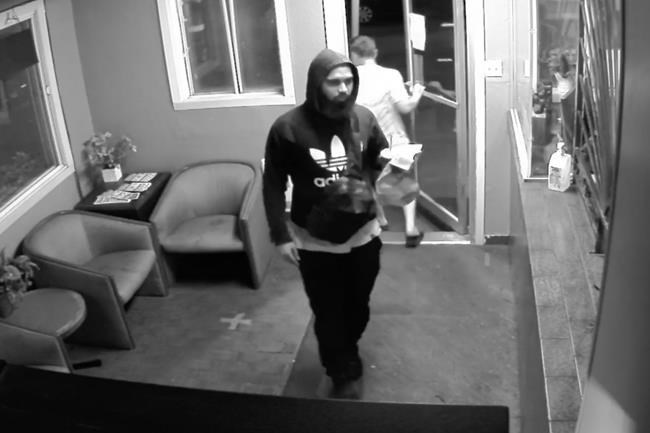MONTREAL — The weapons used to murder three people in the Montreal area at random in August 2022 were homemade by the killer, an expert witness told a coroner's inquiry on Tuesday.
The two guns found on suspect Abdulla Shaikh were "ghost guns" — firearms without serial numbers that are assembled piece by piece, said Marc-André Dubé, a Montreal police firearms expert assigned to the RCMP-led National Weapons Enforcement Support Team.
"Without a serial number on the frame, it's very difficult to identify," Dubé said of the guns, which are designed to be untraceable. But screenshots on Shaikh's various electronic devices suggest he likely built the weapons himself, he said.
Dubé testified on Day 2 of the coroner's inquest into the murders of André Lemieux, Mohamed Belhaj and Alex Lévis-Crevier. All three were seemingly chosen at random by Shaikh over a 24-hour shooting spree.
The coroner's inquest heard Monday that within a one-hour period in Montreal on Aug. 2, 2022, the suspect shot and killed Lemieux and Belhaj, who were both outside. Then Shaikh travelled to Ontario to visit the Toronto Zoo and Canada's Wonderland before returning to Quebec to murder Lévis-Crevier, who was skateboarding on the street in Montreal's northern suburb of Laval.
Shaikh was shot dead by police in a Montreal motel on Aug. 4, 2022.
Dubé said officers found a 9-mm semi-automatic Glock and a high-capacity magazine for 33 bullets in the motel, and a semi-automatic 9-mm Glock 19 in the suspect's rented vehicle, which was nearby. The gun in the car, Dubé said, was modified with a selector switch permitting it to be used as an automatic.
Dubé said authorities weren't able to determine exactly how the suspect acquired the various pieces to assemble the firearms. He said police seized a total of seven prohibited magazines and 190 bullets in the two locations.
Coroner Géhane Kamel is presiding over the inquiry, which is also investigating Shaikh's death.
Earlier Tuesday, Montreal police tactical officers described their shootout with the suspect in the motel room. Officers Jean-Philippe Bergeron and Mathieu Robillard said police used a battering ram to try and burst through the door and arrest the suspect before he could reach for a weapon.
But Shaikh had moved a table and a chair against the door, and the police had to thrust the ram twice into the door to open it enough to see inside. Officers threw a stun grenade into the room to destabilize Shaikh. Robillard testified he made eye contact with the suspect, who he said had a cold, "determined" look.
"When the door opens and I have eye contact, he's already getting out of bed after the second hit (of the door) … he already has a gun in his hand," Robillard said. "For me, with the door barricaded like that, it's extremely clear that he was waiting for someone, if not us, he waiting for somebody."
Robillard said Shaikh started shooting and the officers returned fire. The suspect fell to the ground near the bed. The officer testified that police couldn't see clearly into the room because they had been unable to open the door completely.
Officers, Robillard said, wanted to avoid a second exchange of gunfire, and in order to determine whether Shaikh still posed a threat, they shot plastic bullets at his body to see whether he would move, and used a robot camera and a camera fitted on a telescopic arm to see inside the room.
"We went as fast as we could with the equipment we have to get inside the room and provide assistance," Bergeron said. "Our goal is to provide assistance, but not to the detriment of our own security."
The inquiry has heard that Shaikh, before his murder spree, had been diagnosed with schizophrenia. His family had told police that he had not been taking his medication.
The inquiry continues Wednesday and is also scheduled to sit in October.
This report by The Canadian Press was first published Sept. 26, 2023.
Sidhartha Banerjee, The Canadian Press



